Raising chickens is a fun and rewarding experience. When you spend time with your birds, you’ll get to know their individual personalities. Sometimes they’ll even eat out of your hand! And just like people, your chickens will appreciate some variety in their diets. If you’ve been wondering what to feed chickens, you’ve come to the right place.
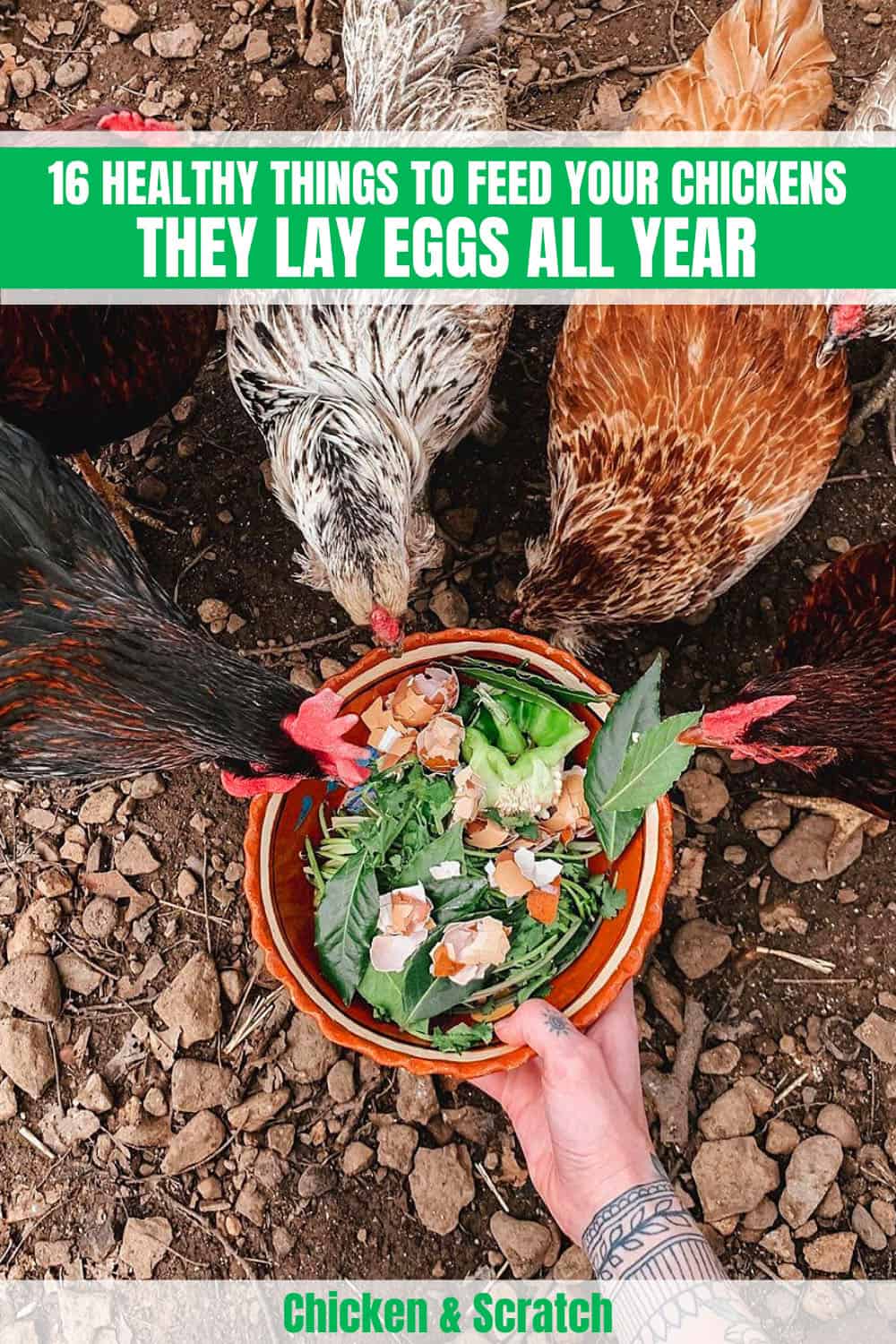
Required Nutrients of Chickens
Before we’ll get into the right food for your flock, let’s study what makes it a great option first. Here are some nutrients your chickens require:
- Carbs: Carbohydrates are a source of energy for many animals and that includes chickens too! Good food for chickens needs to have a substantial amount of carbs to give them the boost they need to forage and be active.
- Protein: This nutrient is essential for a chicken’s growth and development, providing its feathers, muscle structure, and vital organs with a necessary nutrient. This need increases during periods of fast growth while birds are laying eggs when an excess protein supply becomes especially critical.
- Vitamins: To make the most of their diet, vitamins are essential. Chickens need a range of vitamins including vitamins A, D, E, K, and B-vitamins. Such vital nutrients are linked to things like eye health, building strong bones, healthy immune system function, and maintaining the body’s natural metabolism.
- Fats: Fats: Fats are an important source of energy (calories) for chickens. Although they may be considered less healthy than carbs, they are still an essential part of their diet.
The Right Type of Feed
Before delving into the treats you can give your birds, you must ensure you give them the right kind of feed. If you’re starting with baby chicks, it’s essential to provide them with chick starters/growers. This feed is intended to ensure they get all the nutrition they need.
After 18 weeks, you’ll need to switch them to layer feed. This feed is made for adult birds with enough calcium to support laying hens. Ensure you do this gradually–switching feeds abruptly can result in upset stomachs.
1. Scratch Feed
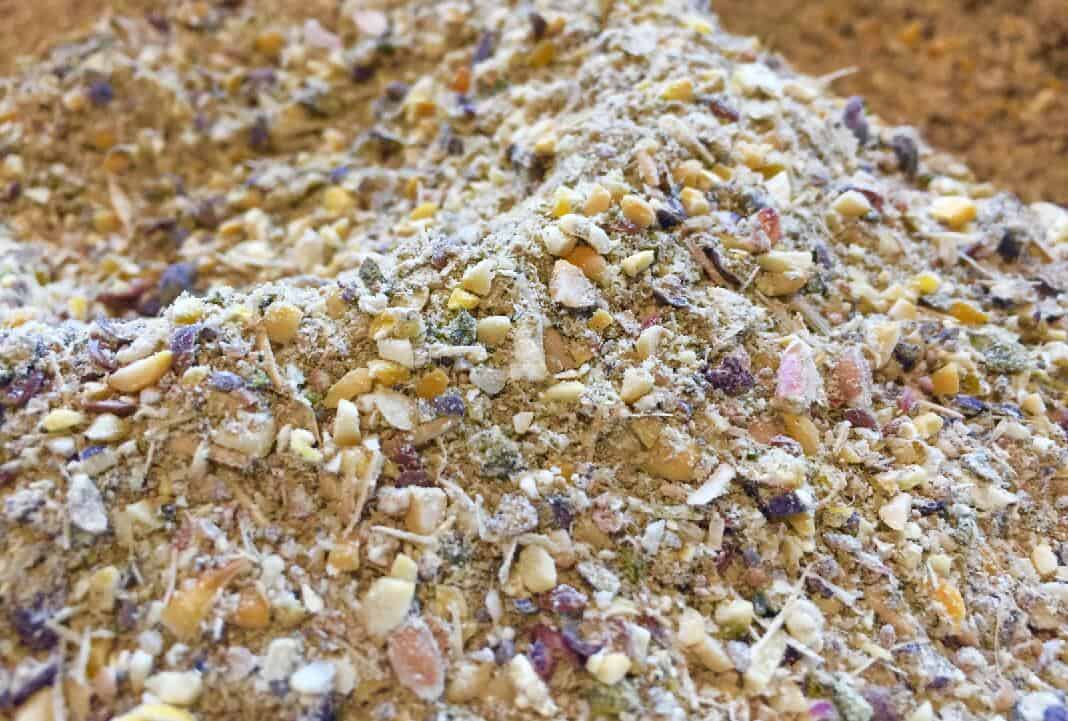
Scratch feed is a mixture of different grains and seeds–it usually contains wheat, cracked corn, barley, and sunflower seeds. It gets its name because chickens will peck and scratch to get to it. A scratch feed can encourage chickens to forage, and it’s excellent for reducing boredom.
However, scratch feed is not a replacement for proper chicken feed. Although it’s a nice treat and can encourage more exercise, a diet exclusively of scratch won’t support your birds’ health. Make sure you don’t overdo scratch, either. Corn can be fattening when fed in large amounts. You also don’t want your birds to avoid their regular feed in favor of scratch feed.
2. Mealworms
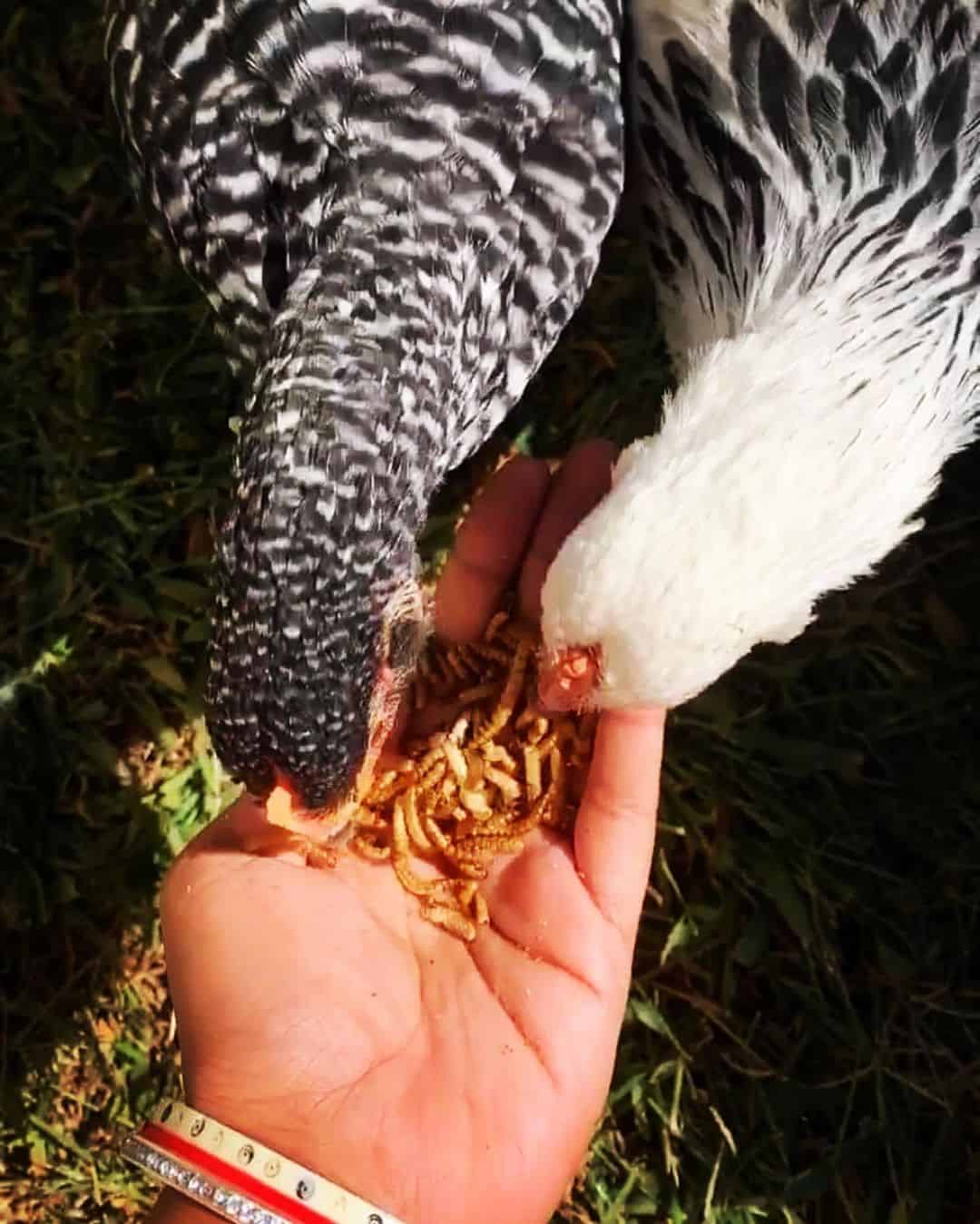
It might sound odd to buy bugs to feed your chickens. But mealworms are a great source of protein. A little protein boost can do a lot for your chickens, especially during molting season–it can help them grow feathers back faster.
You don’t need to buy live, wriggly mealworms to feed–dried mealworms will do just fine. And while they’re healthy in small amounts, don’t overdo it!
Mealworms are high in fat and protein, about 50 percent. Considering that an adult chicken’s diet should only comprise about 16 percent protein, it’s clear that mealworms should be given sparingly–between one and ten mealworms per bird is plenty.
If you want to build a mealworm, read our article: 10 Mealworm Farm Plans You Can DIY at Home.
3. Cooked Oatmeal
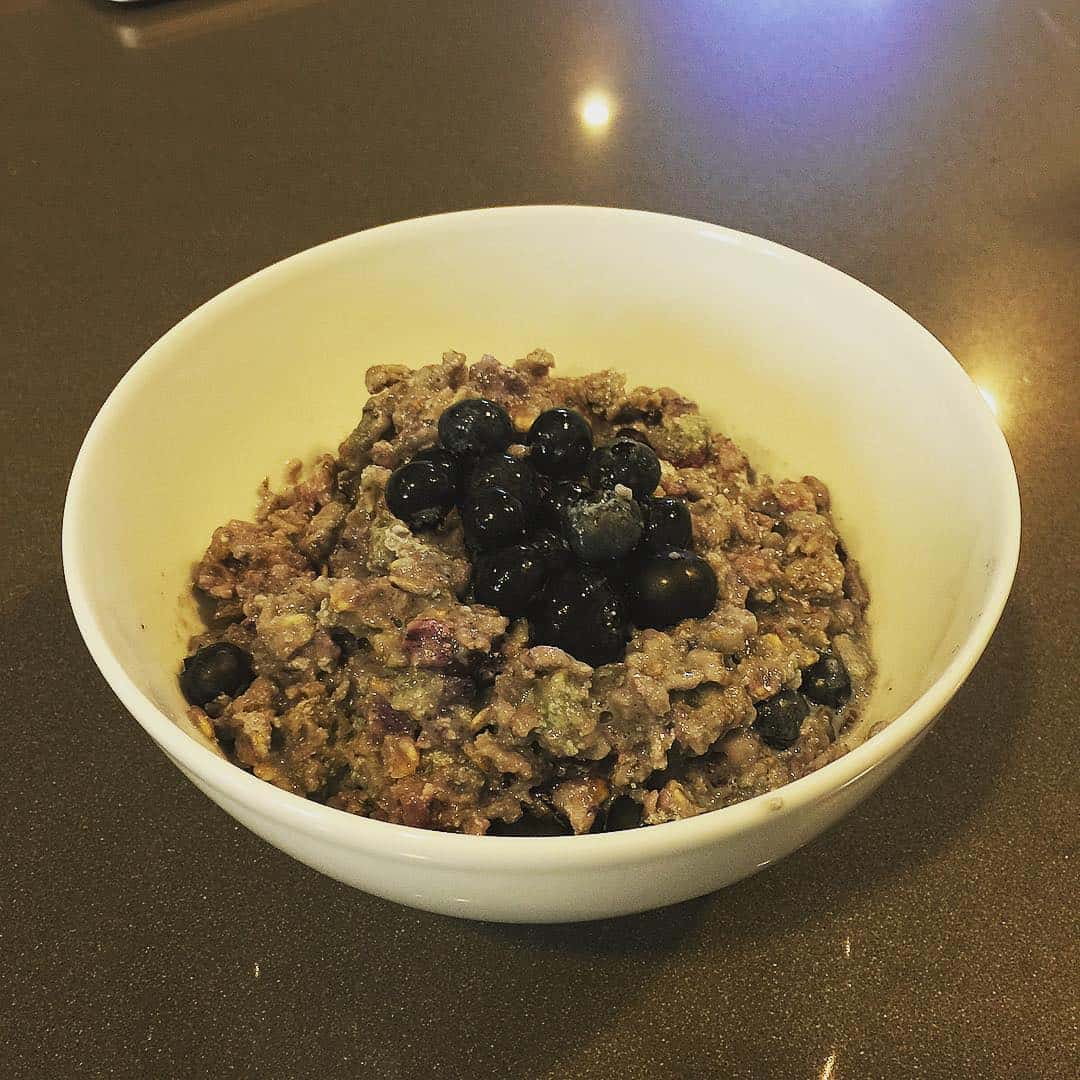
When you think about what to feed chickens, oatmeal probably isn’t what first comes to mind. But oats are a significant ingredient in chicken feed, so it makes sense that chickens like oatmeal, too. Warm oatmeal can be a great snack for them, especially in winter.
There’s even been a USDA study showing that oatmeal improves general health in chickens.
Oatmeal is rich in protein and plenty of micronutrients to keep your birds healthy. You can even cook it with fruit or stir in some of the dried mealworms mentioned above for a special treat.
4. Bread
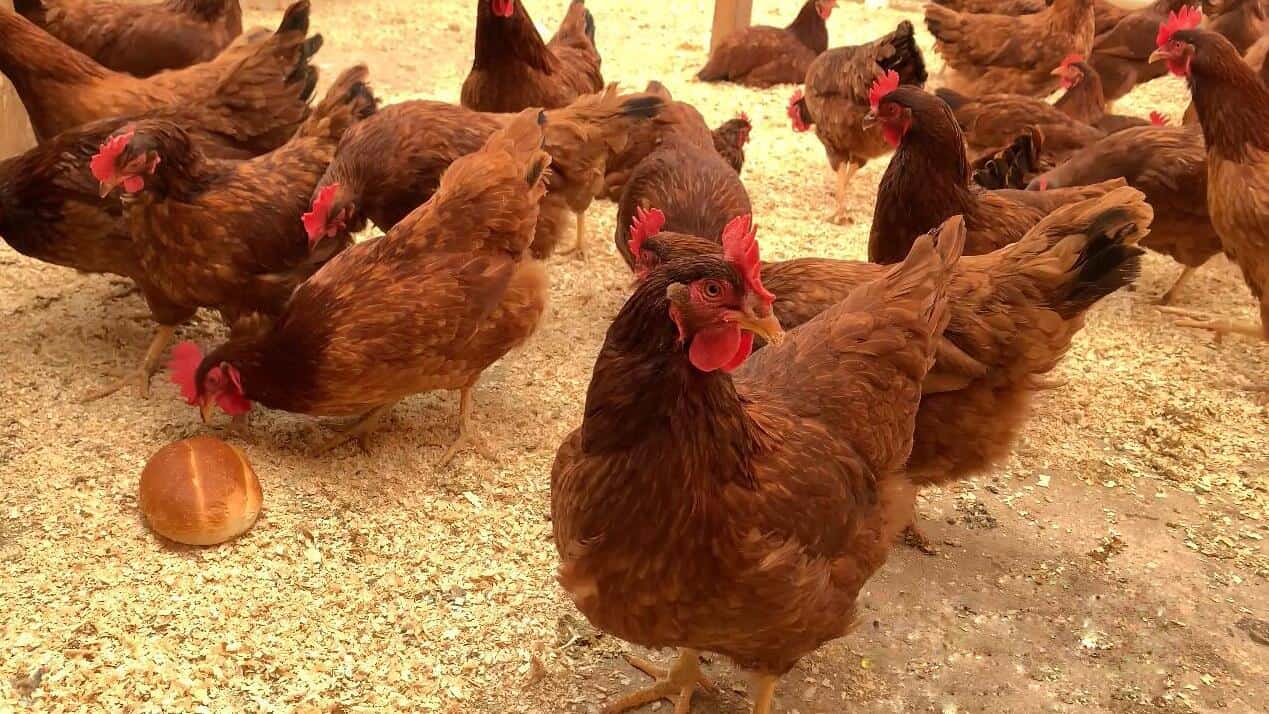
When offering chicken treats, it’s essential only to give starches in moderation. However, bread is a popular treat among many chicken keepers. Feeding your pet chicken bread is a great way to eliminate stale bread. Make sure it isn’t moldy, though–mold can make your chicken sick.
Bread isn’t the healthiest thing on any list of what to feed chickens. Whole grain bread will provide more nutrients and energy. But even white bread is acceptable to offer as a treat occasionally.
5. Berries
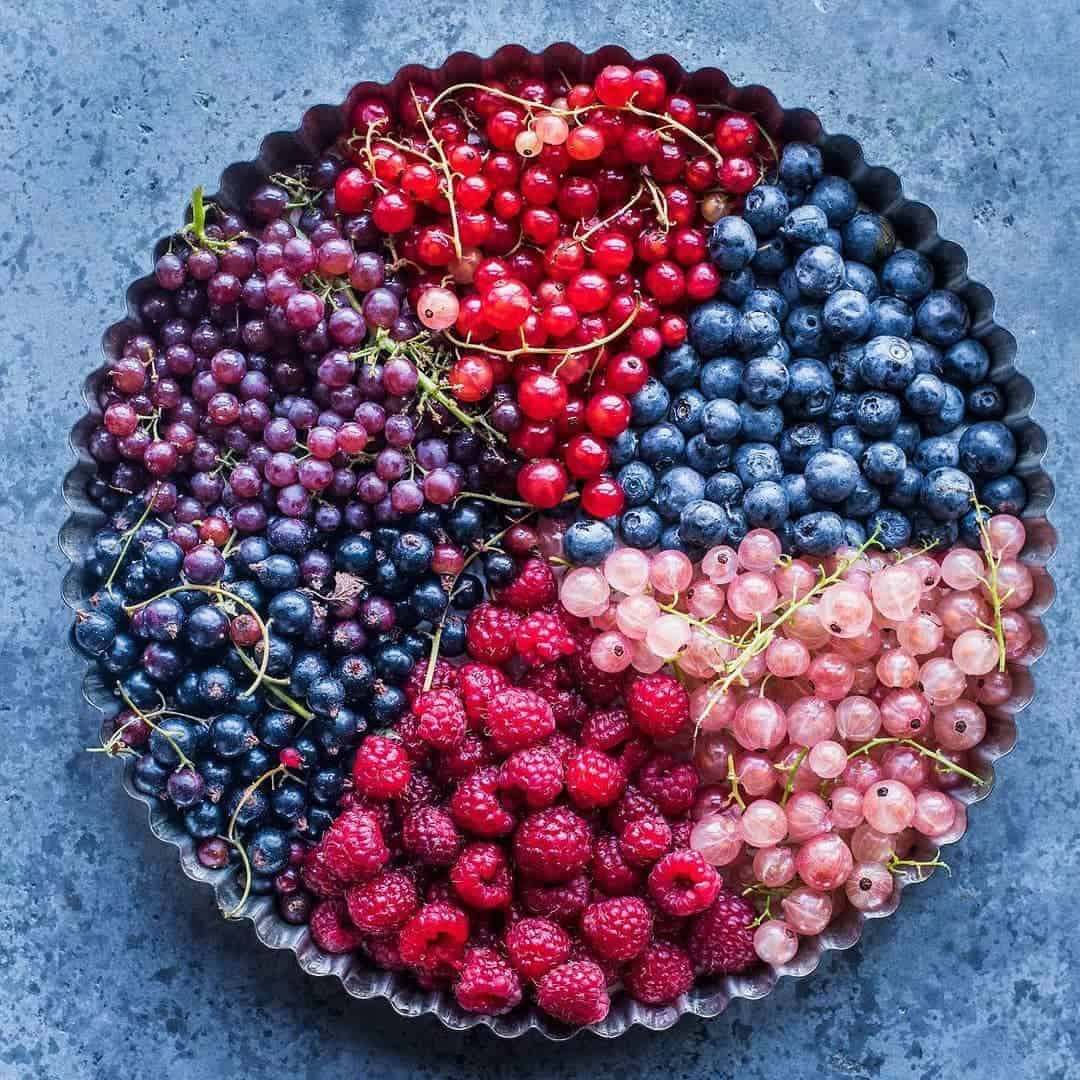
Berries, and especially strawberries, are a significant treat for chickens. They taste sweet and can give your birds an energy boost. Berries are also rich in antioxidants and vitamins. Even if you have a picky flock, almost any chicken will jump to eat some blueberries or strawberries.
If you have space, you can even plant berry bushes where your chickens roam. They can jump up to get berries off the limbs. This may not be possible for everyone, but it’s a great way to add new dimensions to their foraging.
Berries are a healthy treat for chickens, as they contain naturally occurring vitamins and minerals. These can help maintain a balanced diet for your chicken’s health and well-being. Depending on the berry variety chosen, you will typically get some combination of vitamin C.
Micro-nutrients such as iron, copper, manganese calcium, and phosphorus are also in there. Other than that, folate (for egg production) and anthocyanins (for feather development) can improve the quality of appearance for show birds.
Note that not all berries are not safe for chickens. Make sure that they are not a part of the nightshade family or a holly berry.
6. Yogurt
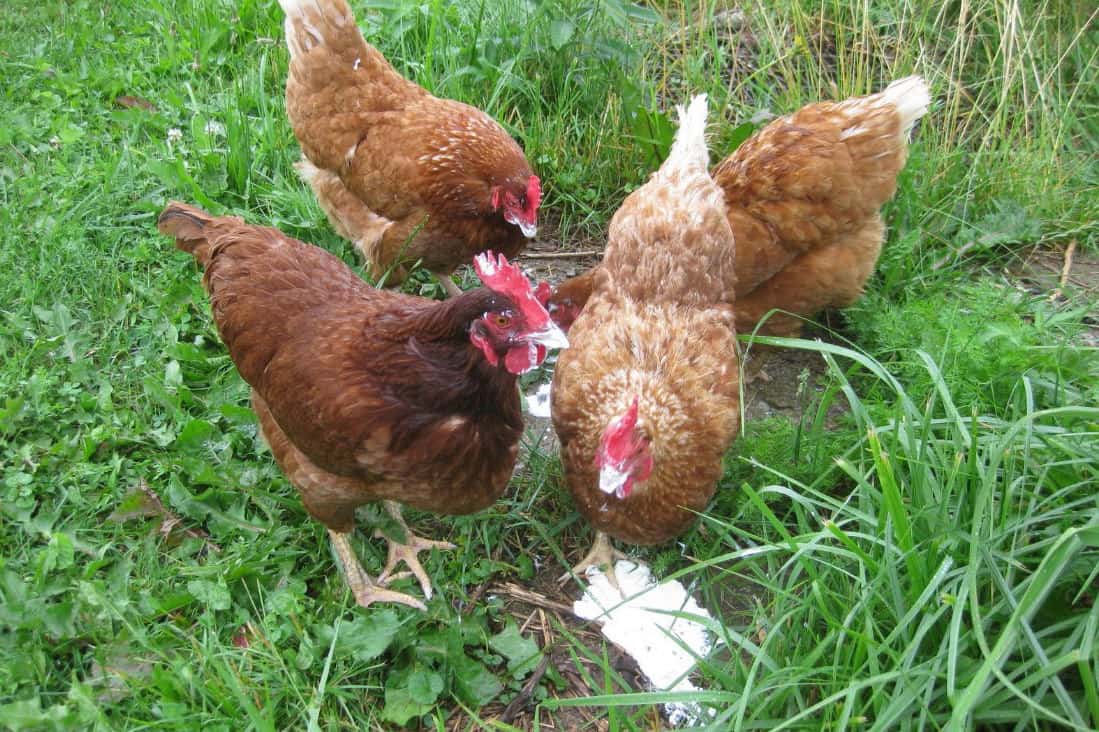
You probably wouldn’t think of yogurt when asking what to feed chickens. However, yogurt has lots of helpful probiotics that aid indigestion. Yogurt is also rich in calcium, making it an excellent treat for laying hens. Some types (like Greek yogurt) also have a lot of protein.
However, when feeding yogurt, stick to plain, unsweetened varieties. Sweetened yogurts often have a large amount of sugar, and it’s best to keep chicken treats as healthy as possible. An occasional taste of sweetened yogurt shouldn’t hurt.
7. Apples
Apples make excellent chicken treats, and they’re rich in vitamins. You can cut up apples into small cubes. If you peel apples for cooking, you can also offer peels to your birds–they’ll love them!
There’s some disagreement over feeding apple cores, though. Apple seeds indeed contain cyanide. However, most chicken keepers seem to agree that there isn’t enough present to kill birds. Others believe the cyanide in the cores makes them unsafe to feed. If you want to be safe, you can permanently remove seeds from each core before giving them to your flock.
8. Pumpkin
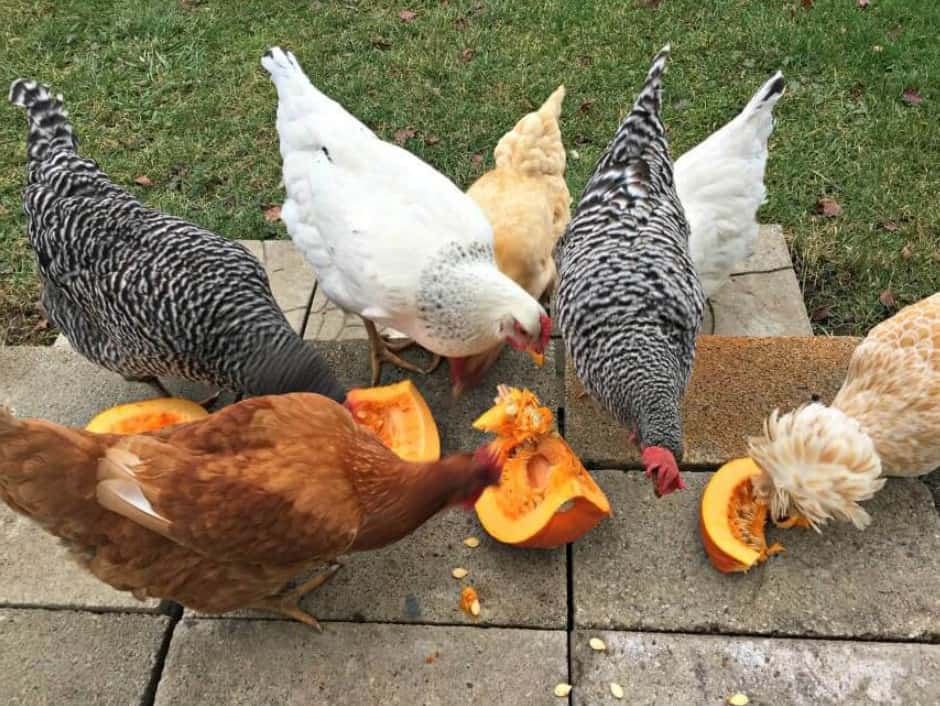
When you’re deciding what to feed chickens, make sure to consider pumpkin. Pumpkin is a food that they can safely enjoy, cooked or raw. For an effortless dietary supplement, you can even offer them scoops of canned pumpkins.
For an especially easy dietary supplement, you don’t just have to stick to the squash itself–pumpkin seeds are also safe to feed. Avoid commercially packaged seeds, as these usually contain high levels of sodium.
Pumpkin seeds act as a natural dewormer, and they work best raw. If you’re making pumpkin soup or carving a jack-o-lantern, try chopping raw seeds and giving them to your birds. You can also stir chopped seeds in with their feed.
9. Leafy Greens
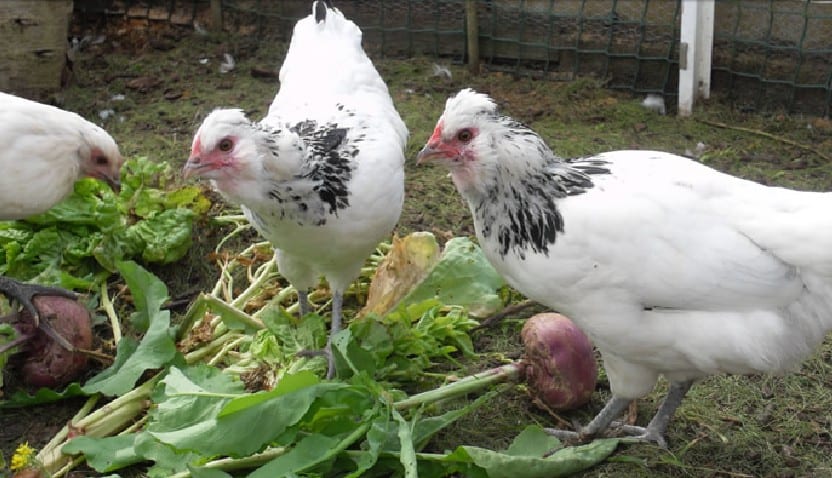
If you’ve ever seen chickens roaming freely, you know they enjoy a variety of green foliage. Leafy greens contain a variety of healthy fats like omega-3 fatty acids as well as important trace elements like zinc, selenium, copper, and cobalt among others.If you want to offer more variety and nutrient-rich options, try feeding them leafy greens. Kale, spinach, collards, turnip greens, and chard are all great choices.
Chickens probably won’t immediately gravitate to greens as they do to sweet foods like berries or dense starches like bread. However, greens can add some interest, especially to confined birds.
If your chickens are in a coop, hang bundles of greens inside. This will give them something to peck at, and the motion of a hanging bundle makes foraging a little more challenging.
Darker leafy greens also have benefits for you. Because they are so full of nutrients, they lead to brighter, richer yolks.
10. Cold Watermelon
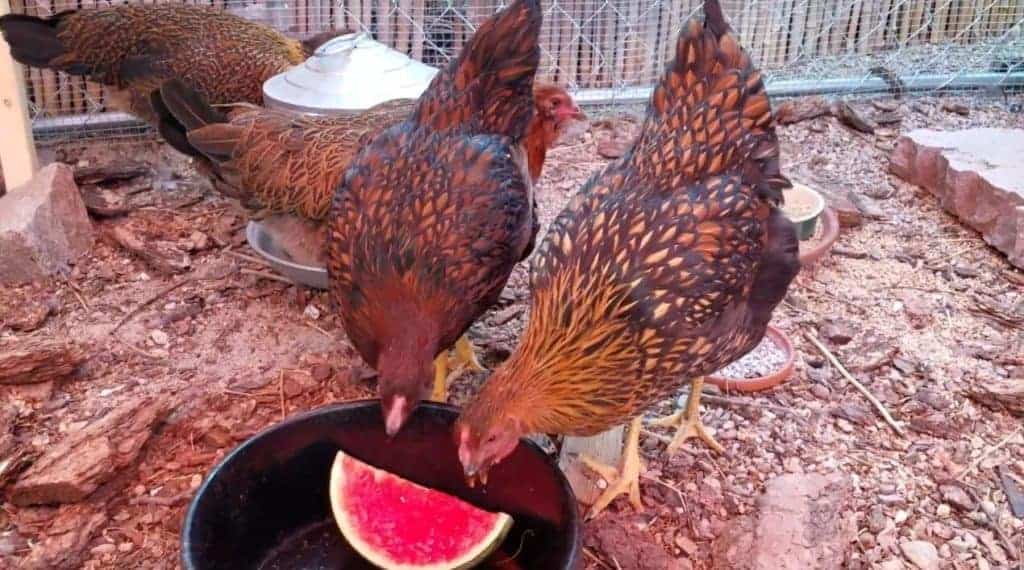
When deciding what to feed chickens, make sure you take the season into account. Chickens are generally hardy animals, but they sometimes find scorching weather difficult. This is especially true for large, heavy breeds like Cochins and Brahmas.
Shade and cold water can help chickens deal with the heat. But if you want to give them some variety, try offering cold watermelon. The seeds and fruit are safe for them to eat. And because of the high water content, it will help keep them hydrated.
11. Cottage Cheese
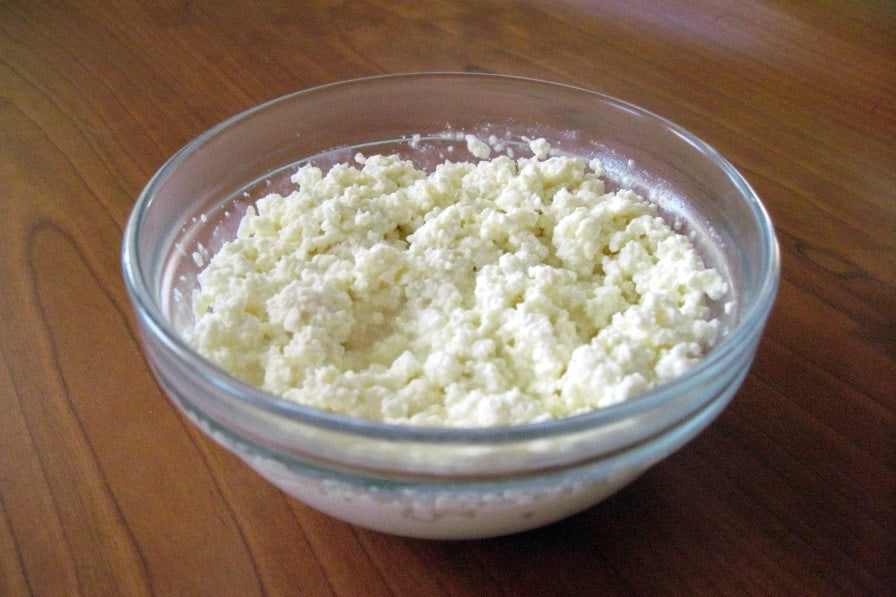
Sometimes, it can be fun to give your chickens something different. And if your birds are prone to boredom, they’ll appreciate being able to try new things. If you like cheese (and who doesn’t?), you might wonder if chickens are safe to eat.
Cheese is made primarily of fat and protein. Chickens need some of each in their diet, but you’ll want to avoid overfeeding. While you can give your birds small amounts of any type of cheese, the healthiest option is cottage cheese. It can be a little messy, but it has less fat than traditional sliced cheese, making it a more balanced dietary choice.
Cottage cheese also has plenty of calcium, so it’s a treat that will help your laying hens with egg production. If you want to give your flock something extra, add sliced fruit or berries.
Many flock owners offer slightly old food to their birds. This is usually safe, but make sure your cottage cheese is not moldy. Mold is toxic to chickens and can make them sick. Remove any uneaten cottage cheese and refrigerate it, especially in warmer weather.
12. Tomatoes
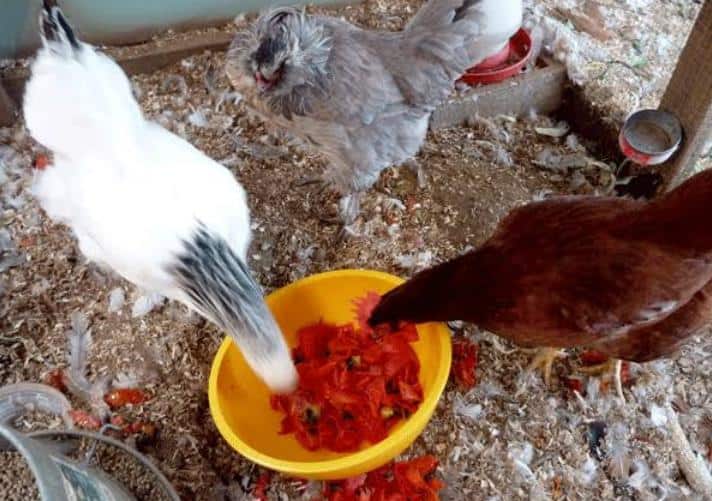
When considering what to feed chickens, many chicken keepers choose something easy. With a few exceptions, chickens can eat most things you do. So if you’re slicing tomatoes for a salad or sandwich, don’t hesitate to offer them some.
Tomatoes are an entertaining treat for chickens. Between the many tiny seeds and larger chunks of flesh, tomato slices will keep your flock busy for a while.
Chickens can consume cooked tomatoes and gain several nutritional benefits from them. Tomatoes contain vitamin A, and B complex vitamins (including thiamin, riboflavin, niacin, and folate), vitamin C, and potassium as well as various antioxidant compounds like lycopene.
Lycopene helps to fight off the proliferation of some cancers in chickens while supplementing many cell functions vital. Manganese levels are also considered beneficial minerals gained through eating tomatoes. Excellent sources of dietary fiber, gamma carotenes which enhance weight gain in adolescent and growing chickens.
13. Grapes
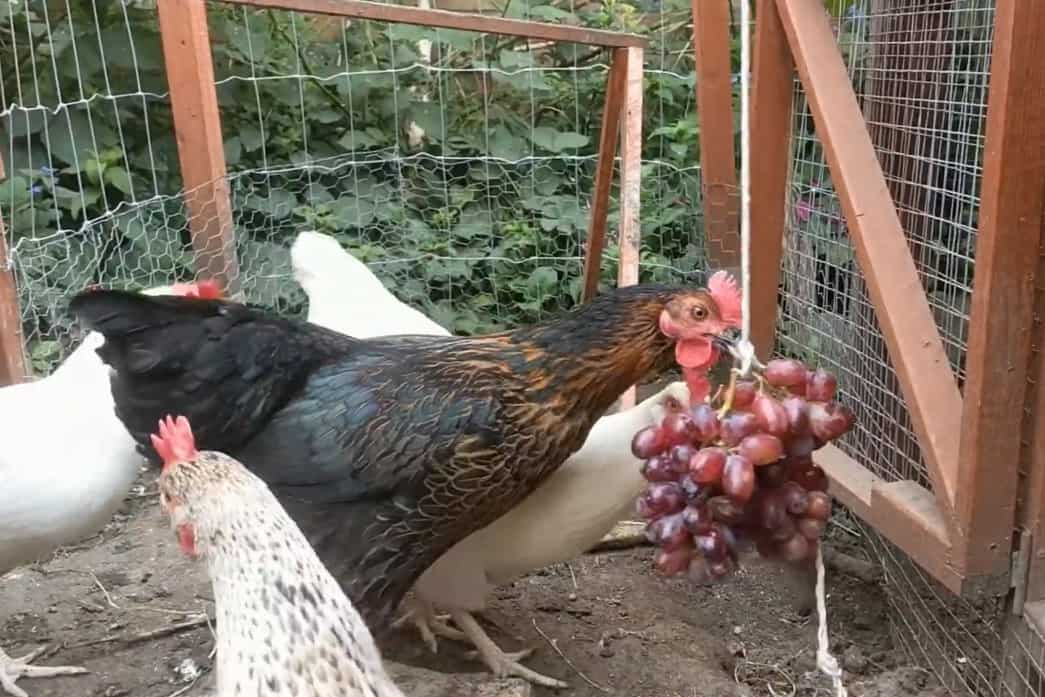
Grapes are a lot of fun to feed chickens. You might even catch them playing keep-away with each other. If your birds are picky about treats, this is a great treat. Most chickens seem to love them and gravitate toward them.
If you’re feeding grapes to smaller chickens or chicks, it’s a good idea to slice them. This will reduce their risk of choking, making the grapes a little easier to eat.
14. Eggs
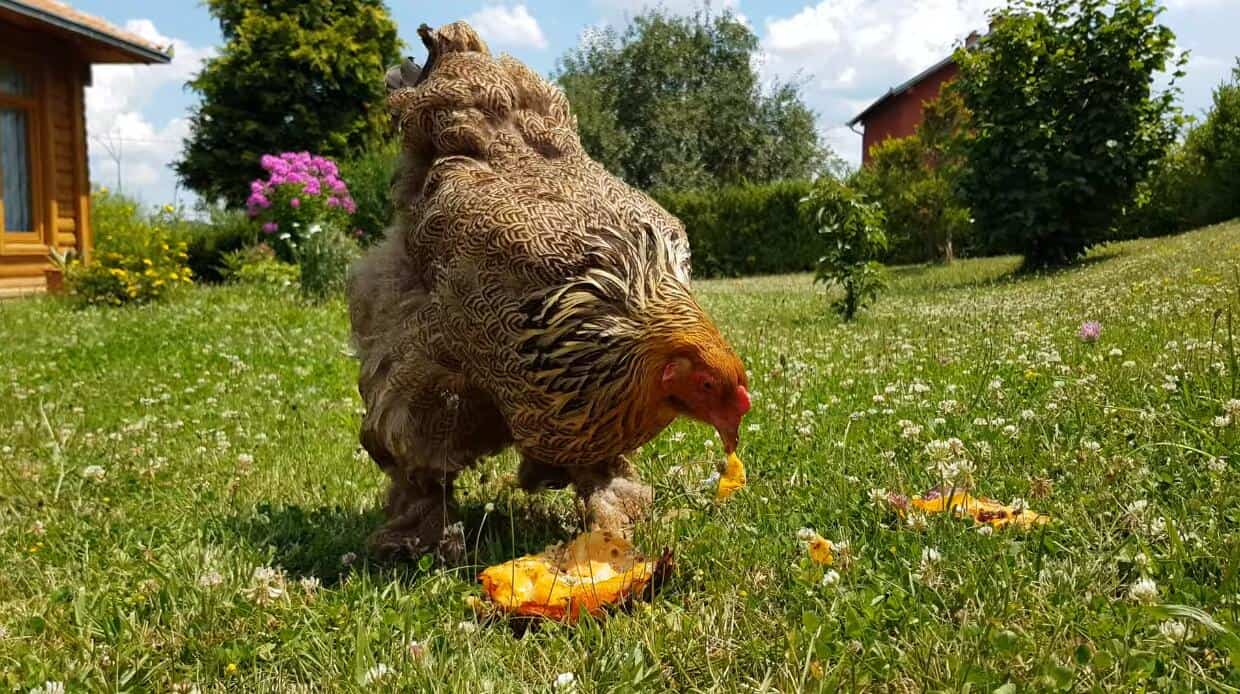
Eggs are probably the last thing you’d think of when choosing what to feed chickens. It might seem counterintuitive and even slightly wrong to provide eggs to chickens. However, egg yolks are the food source for developing baby chicks. Adult chickens can benefit from the protein and healthy fats found in eggs.
If you feed your birds eggs, there is one precaution you should take. Ensure any eggs you provide them are scrambled (ideally without much oil or butter) or boiled. If you provide raw eggs, you run the risk of your hens starting to eat their eggs. This is a tough habit to break. It also reduces the number of fresh eggs you can gather daily.
15. Cooked spaghetti
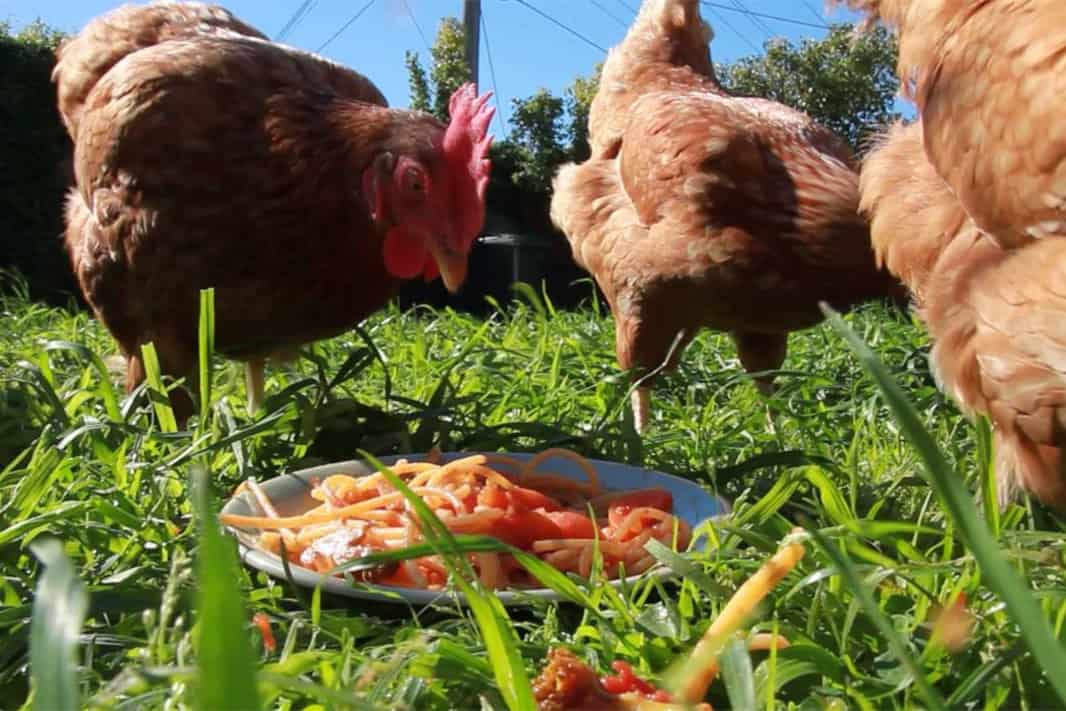
Nutrient-dense foods are usually the most important when deciding what to feed chickens. And while you should usually choose nutritious foods, chickens enjoy occasional junk food. If you cook spaghetti plain, it’s safe for chickens to eat. Longer noodles can encourage chickens to move more as they chase down one another for a bite.
As with most starches, you’ll want to keep this one to a minimum when feeding. But if you want to be entertained while watching your birds eat and want to give them something to do, this is a great treat. Ensure any pasta you prepare for chickens is made without salt since too much sodium isn’t healthy for chickens.
16. Herbs

You probably don’t want to feed all your freshly-grown herbs to chickens. But if you have leftovers, herbs can be a fun treat for your chickens. They also have some health benefits. For instance, mint can lower body temperature slightly, making it ideal for feeding in the summer.
Consider adding a few herbs if you have space to add plants to where your chickens roam. These are plants that grow quickly and don’t need much upkeep. They can add variety to your birds’ foraging choices, and you can trim them when you need herbs for your own cooking.
Summary
Knowing what to feed chickens is essential, especially if you want to give your birds snacks and treats outside their regular diet. You can make your chickens’ days a little brighter by offering healthy, nutritious additions to their diet.

Joseph Hudson has been raising chickens for over 15 years. In 2018, he completed the Agriculture & Natural Resources program at Mt. San Antonio College. He currently raises over 1400 chickens on his 7.5-hectare farm. He keeps sharing his experience on raising healthy and happy chickens on Chicken Scratch The Foundry.
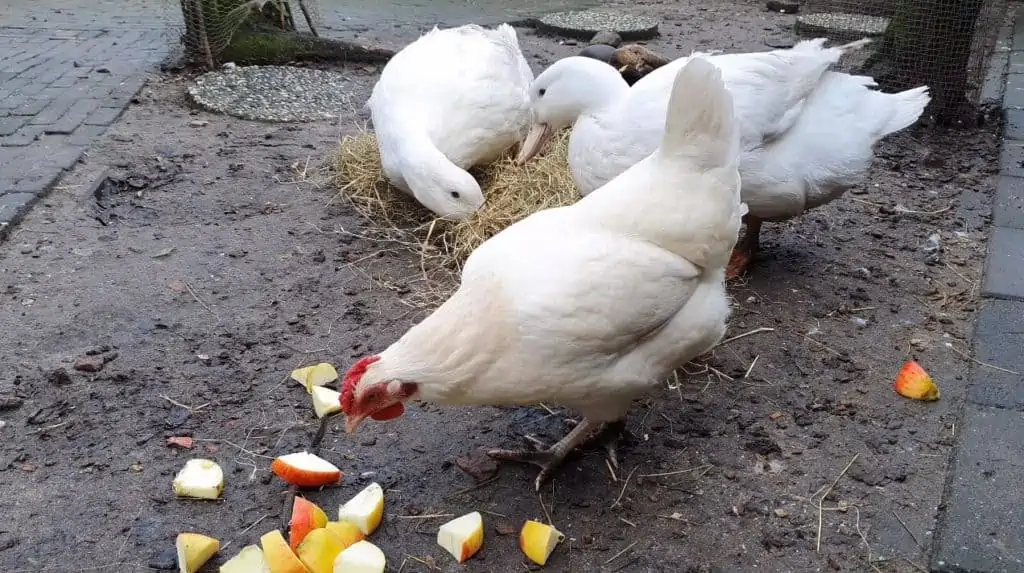







This for me has been very interesting ! I am now responsible for our 10 hens and 1 b rooster. They are about 2 plus years old. Their not laying much but i am not ready to give up on them .Do you have any suggestions !
If it’s the winter, the hens won’t be laying much, especially if they don’t have a lamp in their house. The lamp can easily be knocked over, and it makes them lay for a shorter amount of time in the long run. If they still aren’t laying by the time it’s summer, they may not have enough vitamins. Feed them calcium grit and oyster shells to reduce this, which can be found at a farm store. If they don’t have enough protein and vitamins, they won’t lay because they need to keep their nutrients inside them. They also will not lay as much if they are stressed, which heat can now and then do to them. One thing you can do to keep the heat in the nesting box down is to put frozen water bottles in the nest, although the hens may crowd into the same nesting box to sit on them. If they are sick, they also may not lay as much, or lay ‘fairy eggs,’ tiny eggs they lay when stressed, sick, beginning to lay, or for any various reason. I hope this helps!
PLEASE DO NOT FEED YOUR HENS OATMEAL it contains something called beta gluten, they are unable to digest. it forms a mucous layer on their intestines, causing them to be unable to absorb nutrients, and can lead to necrotized ulcers of the intestines as well. there is a huge amount of so called chicken people claiming oatmeal is a good winter food for your flock, all over the internet. however this not just untrue it is dangerous for your chickens.
Is this correct? I had been feeding cooked & uncooked rolled oats. They even come in commercially packed feeds. Is this the same as oatmeal? Rgds, Liz
Did you ever get a reply to this? I also feed my 5 month old chicken oats.
I have a 10 year old chicken who hasn’t layed an egg in 2 years and today she had an egg that took her 6 hours to pass. What kind of diet can I feed her where she won’t lay any eggs?? What should i not feed her?
Thank you i love it